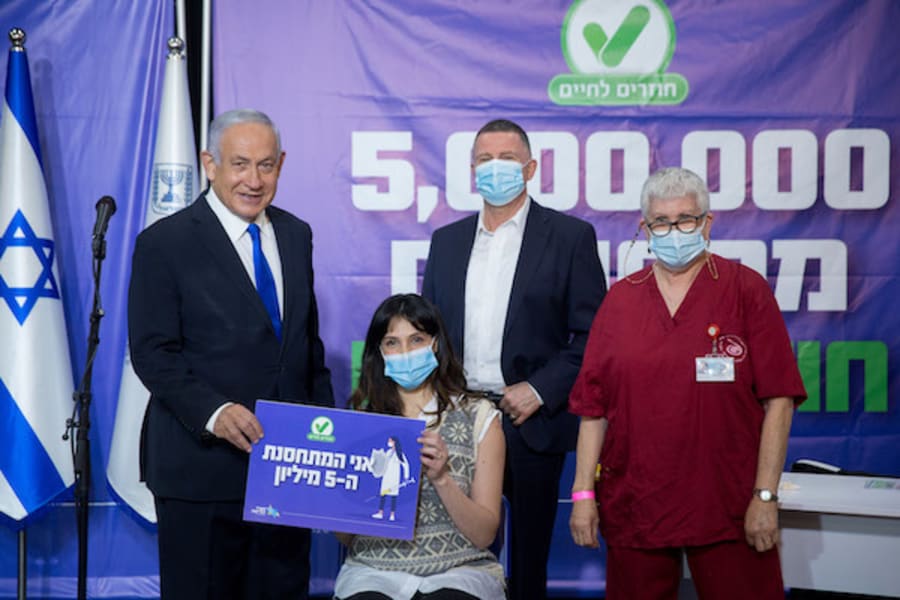Almost 90% of Israelis 16 and older vaccinated or recovered from COVID-19
Israel emerges as world leader in vaccinations, Wall Street Journal notes, though Israeli Arabs, ultra-Orthodox and young women have been reluctant to get the shots

With 5.165 million Israelis having received at least one dose of the COVID-19 vaccine, another 820,000 having recovered from the virus and 2.6 million children still ineligible to receive the injection, Israel is extremely close to “immunity” for almost 90% of its eligible population.
This means that over 55% of Israelis 16 and up have received their two-shot dose in the 12 weeks since the campaign started.
The numbers are incredible and show how Israel has outpaced the world in its rapid rollout of the Pfizer vaccine to a large portion of its population – roughly four times the rate in the U.S., according to an in-depth article in The Wall Street Journal.
How did Israel manage to move so fast and galvanize the public to participate in this campaign?
The Wall Street Journal interviewed Israel’s COVID-19 coordinator, Nachman Ash, 60, who was a combat physician in the Israel Defense Forces and eventually became IDF surgeon general.
Ash detailed the carefully planned rollout. Israel first vaccinated the elderly and those at risk, then after two weeks, lowered the age bracket by a decade each time. In the midst of this, the vaccine was extended to high school students, 16-18 year olds, so they could get back to school and take matriculation exams.
Medical employees, soldiers currently serving in the army and other law enforcement officers were also mass-vaccinated, regardless of age, parallel to the rollout for the elderly.
Ash notes a few major points that also helped propel Israel to success:
The vaccines are being administered through Israel’s four HMOs, a delivery system that “would be impossible to replicate in the U.S., with its hodgepodge of unconnected medical providers and insurers,” the article notes.
Israel made a deal with Pfizer in order to stockpile the COVID-19 vaccine. “Israel got the shots early, and in the quantities it needed, and in exchange Pfizer received access to the results of the vaccinations, tabulated by a country with a first-rate medical system and a reputation for statistical and scientific integrity,” the article says.
Israel combatted vaccine skeptics and what it calls “fake news” about the vaccine: The government sought out websites and voices on social media that questioned the mRNA injection – and shut them down. “Some young women are afraid they risk losing their fertility. This is baseless,” Ash said.
The government also reached out to specific demographic groups, such as the ultra-Orthodox, who were more resistant to the vaccine – and managed to convince them. “These groups are influenced by their rabbis, and we have had good discussions with the rabbis about the vaccinations. They are encouraging people to get vaccinated, so we’re now doing pretty well with them,” Ash said.
Ultimately, Israel was able to break down any remaining hesitancy by introducing the “Green Pass” system or the green passport. Vaccinated and recovered Israelis need this to enter gyms, hotels, concert venues and indoor restaurants. Without this, Israelis cannot gain access to these venues and many companies are requiring it in order to hold one’s job.
Israel also pushed the envelope using the vaccine on groups that had not been part of Pfizer’s trials, such as pregnant women and children ages 12 and up who fall into high-risk health categories.
The results in Israel are similar to Pfizer’s trials: “We’re seeing around a 95% effectiveness for preventing disease. So in real-life data analysis, the results are as good as the research that Pfizer had done,” Ash noted.
“Once around 80% of the population of Israel is vaccinated, we’ll be close to herd immunity,” he said presumably including children ages 12 to 15 in his calculations.
Infection rates are down to levels not seen in months including the number of serious cases in the hospital – once having peaked at 1,200 – are now hovering at half that.
This comes after a third national lockdown from Jan. 8 to Feb. 7 when residents were confined to a 1,000-meter perimeter, schools were shut and most businesses remained closed.
“I believe that each of the three times we had to use the lockdowns, it was absolutely necessary,” Ash told the WSJ.
After weeks of lockdown and strict closures on the economy and the airport, Israel has peeled back most restrictions and allowed for a wide opening of the economy. Even the airport, will begin receiving flights from all destinations in the world starting from Tuesday. Arrivals are still limited to a maximum of 3,000 passengers a day, and only for Israeli citizens.
The loosening of incoming travel restrictions was made ahead of the upcoming March 23 elections and is expected to accommodate Israelis abroad who wish to cast their ballot.
In addition, the Ministry of Health is considering repealing the requirement to wear face masks while outdoors as soon as next month.
Israel reached a grim milestone this week, however, passing the 6,000-mark in deaths due to COVID-19 in the past 12 months. Almost half of all deaths in Israel attributed to COVID-19 occurred in the first three months of 2021 alone. From March to December, 3,325 COVID-19 deaths were registered for 2020. The number of deaths stood at 6,025 as of Monday.

The All Israel News Staff is a team of journalists in Israel.













